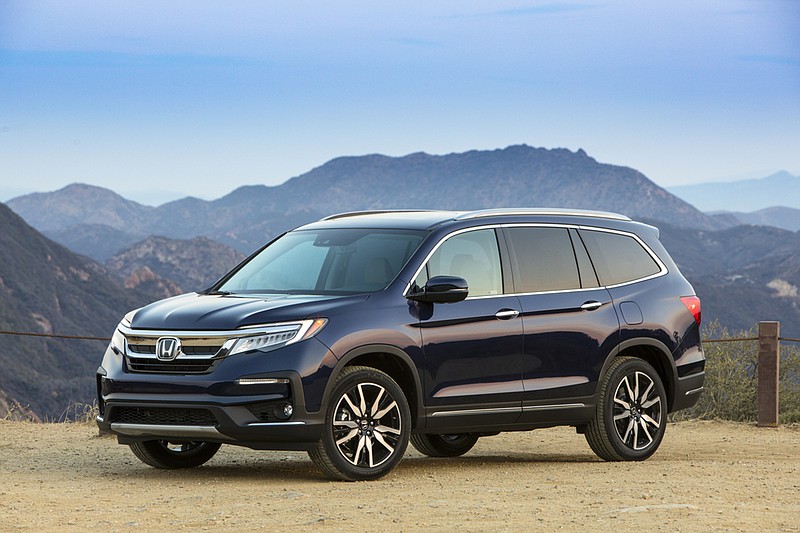The good news about the refreshed 2019 Honda Pilot Elite is the nine-speed transmission operates without a hitch. The bad news is the top trim level costs over $48,000.
What's worse is that price is about average for a well-equipped three-row midsize SUV. A basic Acura MDX with the same powertrain costs less, but doesn't have all the dings, zings and things. Compared to the top two contenders in the class, Pilot Elite is about $4,000 more than the top Subaru Ascent and a couple hundred less than the top Volkswagen Atlas.
These are the two newest offerings for America's favorite family hauler, and they are arguably the best. The only knock against the Pilot has been fixed for the midcycle refresh and it once again should be considered in the top three.
All three do the same things and serve the same needs, so the differences come down to personality. It's what makes a Pilot a Honda and an Ascent a Subaru. Different personalities appeal to different people, that's why most people who read car reviews (bless you) mostly want validation of that most unquantifiable thing: a feel.
The feel of the Atlas is conservative but handsome styling with a powerful powertrain and technology that is more layered than intuitive, with more options than you can count.
The feel of the Ascent is understated, with standard AWD safety and capability a priority over power, and with technology that is more compartmentalized than streamlined. It's easier to understand but kind of all over the place. Yet it has one of the nicest interiors, which is unusual for Subaru.
Despite a revised fascia intended to be more aggressive, the Pilot blends into the midsize SUV space with bland styling and big overhangs. On old dirt roads strewn with rocks in the Colorado Rockies at 11,000 feet, the Pilot's torque vectoring AWD system was surprisingly capable. It provided the kind of confidence needed for modest off-roading or short-cutting on questionable access roads.
On the inside it feels the roomiest. Yet the lighter weight Pilot doesn't drive like the largest; in AWD it gets 2 mpg better in the city, and 3 mpg better highway than the Atlas, which is a big deal. Ascent is about the same as Pilot, and they both come with three seats in the third row, whereas the Atlas only has two. All claim to have a towing capacity of 5,000 pounds.
A closer look at the specs reveals that feel is not the same as fact; Atlas has the most cargo and passenger room. But the Pilot feels roomier. Go figure.
Given that both the Ascent and the Pilot come standard with the suite of advanced driver assistance systems that include emergency braking and adaptive cruise control, the Subaru Ascent is the best value of the three, and also the pokiest.
The Pilot has solid acceleration and passing power from its 280-horsepower V-6 engine. Shifts are smooth and predictable from the nine-speed transmission, including start up in second gear for a lurchless launch. The start/stop system has been revised to include fewer restarts when the a/c is on, though we didn't test this because, well, November. It does feel quicker to startup off the brake pedal, however. I don't think it's enough to persuade start/stop haters, but it makes the tech more livable and less noticeable.
On the inside, the Elite trim doesn't have that same premium feel as the surprising Ascent. It has leather trimmed seats, heated leather-wrapped steering wheel and mid-row captain's chairs, but the control interface and dash and door panels feel like massaged plastic, not unlike the Atlas.
Could a $48,000 purchase come down to the all-important third row? Taking a page from the Odyssey minivan and the Acura MDX three-row crossover, the seat folding, shifting and configuring is about the easiest in the class without power buttons. Third row seats are easy to collapse from the rear with pull straps that collapse the headrests; Ascent requires manual lowering of headrests to collapse the third row. Mid-row seats are as easy to move forward as the push of a button. Ascent uses a slider but claims to have a larger door opening; Atlas uses a more traditional latch that requires a bit more strength than a seven or eight year old. Pilot is easier overall. Adding to the ease is a motion activated liftgate new for
2019.
Up front the steering wheel controls are simplified but still busy; once you get the feel for how to navigate through the revised instrument cluster, you don't really need the eight-inch touch screen. That screen uses swipe and pinch functions, and has a swipe right or left feature to access subsequent menu pages. The main menu icons are large and the system easy to use. When in navigation, for instance, there are tiny icons on the top bar to switch to the audio page. Easier and safer to use the instrument cluster controls. And there is a volume knob. Voice recognition is very good.
The refreshed Pilot pushes all the right buttons to keep pace with the newcomers in a segment that is rarely exciting but gives owners the kind of versatility, practicality and sophistication they prefer. When it comes down to which one is best, it'll be the one that feels the best.

